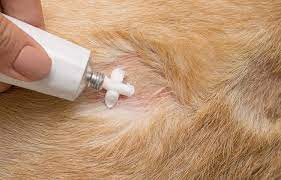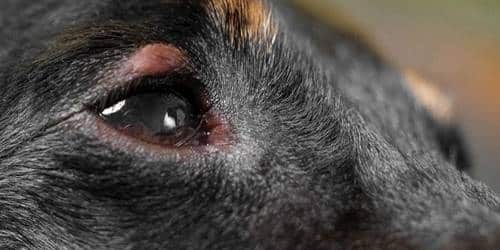Using a hydrocortisone cream can be very soothing if your skin is itching from an insect bite, but is it safe for your dog’s skin? Here, we’ll discuss instances where hydrocortisone is safe for dogs and how you can apply them.
What Is Hydrocortisone Cream?
The skin cream hydrocortisone contains a modest amount of steroids. Most over-the-counter hydrocortisone creams include 0.1% to 1% hydrocortisone per gram, and some even have antibacterial characteristics to combat bacteria. When used on minor bug bites and irritating skin irritation, most lotions stop the itch and reduce inflammation within 30 minutes. Many different types of hydrocortisone cream are available over the counter at your local drug store or pharmacy, but prescription-grade steroid creams are also available at your veterinarian’s clinic.
Is Hydrocortisone Safe For Dogs?
When a few precautions are taken, hydrocortisone cream is generally safe for dogs. Most over-the-counter hydrocortisone creams are safe for dogs as long as they are administered to the skin in modest doses and in areas they cannot lick.
This type of ointment has been discovered to be highly useful for dogs when used for minor skin inflammation and edema. Several veterinarians may even prescribe hydrocortisone cream for dogs, demonstrating how useful it is to have in your dog’s first aid box. There are several limitations to using this itch-relieving lotion on our canine friends, but we will go into the specific usage in dogs below.
5 Uses of Hydrocortisone Cream in Dogs
Hydrocortisone is a strong chemical that has been utilized in animals since the 1970s to successfully treat skin disorders in dogs.
The following are five of the most prevalent conditions for which hydrocortisone is prescribed for dogs
#1. Atopic Dermatitis
Atopic dermatitis is a veterinarian term for a persistent skin condition caused by an allergic reaction in a dog.
Antihistamines, cyclosporine, and corticosteroids such as hydrocortisone cream for dogs are likely to be advised and given by your veterinarian to treat this skin condition.
They might be either oral or topical prescription medications. Topicals will be administered directly to the irritated skin.
Many studies have demonstrated that hydrocortisone is safe and can considerably relieve the symptoms of atopic dermatitis in dogs.
#2. Other Canine Allergies
Allergic responses in dogs are possible on occasion.
If your dog exhibits any of the following symptoms, it is suffering from allergies: runny nose, excessive sneezing, biting and licking their paws, rash development, itchy skin, and/or lethargy.
While a veterinarian should be consulted for chronic allergies in dogs, non-threatening allergies, many of which occur seasonally, can be treated with hydrocortisone cream for dogs and other hydrocortisone treatments, such as flea allergy dermatitis.
It is crucial to note, however, that hydrocortisone will not address allergy at its core.
The only impact of hydrocortisone is to relieve any potential inflammation or discomfort on your pet’s skin.
#3. Itching (Hot Spots)
A dog with pruritus is more prone to aggravate common dog ailments like bug bites (mites, ticks, fleas), allergies, or small injuries like cuts or scratches.
In such instances, dogs are more prone to lick, itch, or bite at their own skin or paws, aggravating matters further.
Hydrocortisone cream for dogs has been found in studies to aid with pruritus.
Pruritus is a chronic itch in dogs that can be caused by bug bites or allergies.
Pruritus can cause or contribute to the formation of hot spots (moist dermatitis or pyotraumatic dermatitis).
Hot spots are more common in certain dog breeds, such as Beagles.
#4. Poison oak, ivy, and sumac
Rashes caused by hazardous plants such as poison oak or poison ivy usually go away in less than a month.
Yet, scratching can prolong this ailment, cause it to become inflamed, and potentially lead to more serious infections in dogs.
Hydrocortisone cream for dogs is an effective treatment for various conditions. It is not intended to treat, but rather to alleviate discomfort in the pet by reducing or eliminating itching and allowing for a faster recovery.
#5. Addison’s disease
Addison’s disease affects the endocrine system of dogs and is caused by insufficient hormone production by the adrenal glands.
Mineralocorticoids are produced by these glands, which are found near a dog’s kidneys.
Low heart rate, collapse, dehydration, loss of appetite, and vomiting are all indications of Addison’s disease in dogs (Hypoadrenocorticism).
Corticosteroid replacement therapy is the most often used treatment for dogs with Addison’s disease.
Which Hydrocortisones Are Safe for Dogs?
While most over-the-counter lotions are probably enough, there are a few hydrocortisone creams and sprays designed expressly for dogs.
The following are some of the safest hydrocortisone creams for dogs:
- Pet MD Hydrocortisone Spray
- Veterinary Formula Hot Spot & Itch Relief Spray
- Zymox Veterinary Strength Hydrocortisone Cream
The lotions and sprays listed above are ideal for our canine companions because they are free of any substances that could make them sick if they lick it after it has been applied to their skin. As a result, we recommend keeping one of the aforementioned alternatives in your pet’s first aid bag!
If you need hydrocortisone cream right away and don’t have any dog creams on hand, you may usually pick any alternative from your local drugstore. Just keep in mind that if the cream contains alcohol, you must ensure that your dog cannot lick it after it has been applied to its skin.
When Is Hydrocortisone Safe For Dogs?
So, when should you apply hydrocortisone cream to your dog’s skin? Hydrocortisone cream is only appropriate for dogs that have modest skin irritation as well as those who have acute skin irritation. To ensure you understand when it is acceptable to apply hydrocortisone cream on your dog’s skin, we’ve included a few examples of safe use below.
In dogs, hydrocortisone cream can be used to treat the following skin irritations:
- Ant bites, mosquito bites, bee stings, and any other critter with an annoying bite or sting
- Mild rashes caused by plants such as poison ivy, poison oak, and other irritants
- Small hot patches without evidence of an active infection, such as swelling, odor, or significant pain
As long as it is not applied to open wounds, it will not cause skin irritation from allergies.
While we always recommend calling your physician first and getting their consent, it is usually safe to use hydrocortisone cream on your dog in the scenarios listed above. Just make sure you just use it twice a day, at most. If your dog is still irritated between doses, consult your veterinarian about a prescription strength choice.
When Is Hydrocortisone Cream Not Safe For Dogs?
Now that you know when you can and should use hydrocortisone cream in dogs, it’s time to go over when you shouldn’t. We always recommend contacting your veterinarian before using this cream in a few conditions, which we will describe below.
In the following instances, do not use hydrocortisone cream on your dog without first consulting a veterinarian:
- Your dog is either pregnant or nursing.
- Your dog suffers from a persistent skin problem.
- The skin inflammation on your dog’s face occurs around its eyes or lips.
- Your dog is currently on any other medications
- Your dog’s skin irritation has lasted more than 72 hours or looks to be getting worse by the day.
- The dog has open wounds on his or her skin.
- Your dog’s skin is infected, as evidenced by open wounds, seeping wounds, swelling, pain, or stench.
- Your dog is exhibiting symptoms of an allergic reaction, such as facial swelling, skin redness, hives, breathing difficulties, or Gastrointestinal discomfort. You may still be able to use hydrocortisone cream, but your dog will most certainly require additional medical attention.
If your dog has any of the symptoms or scenarios indicated above, you should not use hydrocortisone cream to its skin until you have received consent from your veterinarian.
How to Administer Hydrocortisone to Dogs
Once or twice a day, apply hydrocortisone cream to the affected region. But first, make sure there isn’t an open wound. Only apply the cream on minor cuts and abrasions with closed skin (or a scab).
Apply the cream to your skin rather than your fur, and then wash your hands. Prevent your dog from licking the affected region for at least 30 minutes to allow the medication to sink in and begin working to ease discomfort.
If your dog has an itchy scab, apply the ointment to the surrounding skin rather than directly on the scab. The cream’s moisture may help to break down the scab.
Will Licking Hydrocortisone Cream Make My Dog Sick?
When it comes to scratching, nibbling, or licking a region that bothers them, some dogs are rather persistent. If your pet insists on licking the area where you administered hydrocortisone cream, it may produce some moderate symptoms, such as:
- Heightened hunger or thirst
- Panting
- Pacing around the house.
Your dog may require an Elizabethan collar to avoid ingestion of hydrocortisone cream, especially if the cream must be applied for several days. The cone-shaped collar stops puppies from licking or chewing on any part of their body.
How Much Hydrocortisone Should I Apply to My Dog’s Skin?
Hydrocortisone is a transitory solution that should not be utilized for an extended period of time. If your dog’s skin remains red, inflamed, or begins to exude pus, it’s time to seek medical attention. Your veterinarian can identify the underlying cause and treat it to permanently resolve the issue.
In Conclusion,
Hydrocortisone lotion is an excellent technique to relieve minor skin irritation in your canine pet. As long as you follow the safety recommendations we addressed in depth above, your pet should be able to find comfort and return to normalcy in no time!
Related Articles
- PROSTATE CANCER IN DOGS: Symptoms and Treatment
- WHAT YOU SHOULD KNOW ABOUT FLEA DIPS FOR DOGS
- FECAL TEST FOR DOGS: Requirements And Guide
- DO DOGS GET HEMORRHOIDS? All You Need To Know
- How Long are Goats Pregnant: Gestation Period and Litter Size






